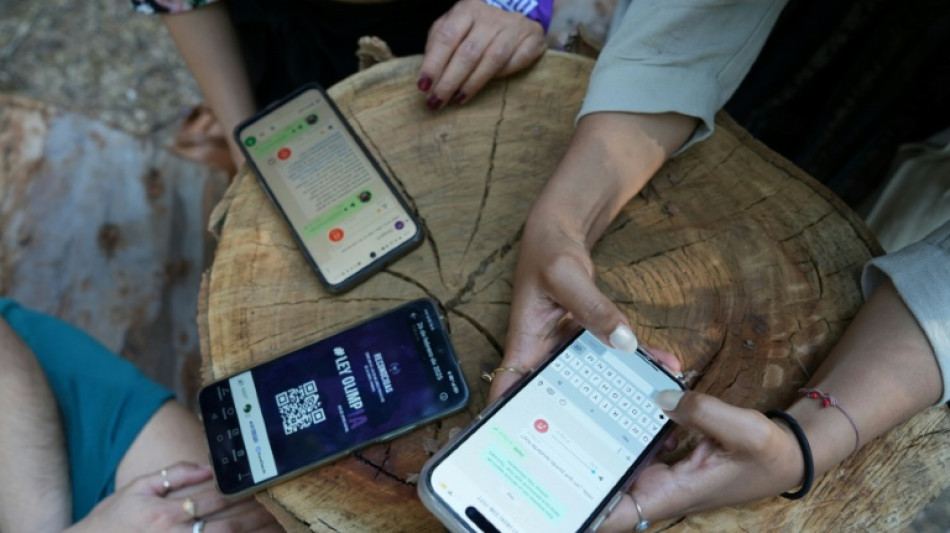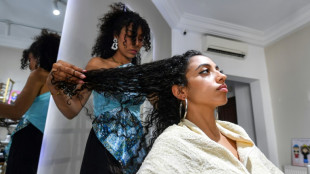
-
 Asian markets mixed as investors await key speech
Asian markets mixed as investors await key speech
-
Ten hurt, 90 arrested as match abandoned following fan violence in Argentina

-
 Indian heritage restorers piece together capital's past
Indian heritage restorers piece together capital's past
-
Australian Rules player suspended for homophobic slur

-
 Online behaviour under scrutiny as Russia hunts 'extremists'
Online behaviour under scrutiny as Russia hunts 'extremists'
-
Malaysia rules out return of F1 over costs

-
 German firm gives 'second life' to used EV batteries
German firm gives 'second life' to used EV batteries
-
Wallabies great Will Genia announces retirement at 37

-
 South Africa spinner Subrayen cited for suspect bowling action
South Africa spinner Subrayen cited for suspect bowling action
-
Menendez brothers face parole board seeking freedom after parents murders

-
 Weaponising the feed: Inside Kenya's online war against activists
Weaponising the feed: Inside Kenya's online war against activists
-
Africa could become 'renewable superpower', says Guterres

-
 Suspended Thai PM in court for case seeking her ouster
Suspended Thai PM in court for case seeking her ouster
-
Errani, Vavassori retain US Open mixed doubles title in revamped event

-
 Surging tourism is polluting Antarctica, scientists warn
Surging tourism is polluting Antarctica, scientists warn
-
Ten Hag hoping for fresh start at rebuilding Leverkusen

-
 Five players to watch at the Women's Rugby World Cup
Five players to watch at the Women's Rugby World Cup
-
Suarez fills Messi void as Inter Miami beat Tigres 2-1

-
 Asian markets creep up as investors await key speech
Asian markets creep up as investors await key speech
-
New Zealand spy service warns of China interference

-
 Brazil police accuse Bolsonaro and son of obstructing coup trial
Brazil police accuse Bolsonaro and son of obstructing coup trial
-
Israel approves major West Bank settlement project

-
 North Carolina braces for flooding from Hurricane Erin
North Carolina braces for flooding from Hurricane Erin
-
Pensioners on the frontline of Argentina's fiery politics

-
 'Curly is beautiful': Tunisian women embrace natural hair
'Curly is beautiful': Tunisian women embrace natural hair
-
Sudanese lay first bricks to rebuild war-torn Khartoum

-
 Newcastle host Liverpool amid Isak stand-off, Spurs test new-look Man City
Newcastle host Liverpool amid Isak stand-off, Spurs test new-look Man City
-
Texas Republicans advance map that reignited US redistricting wars

-
 South Africa spinner Subrayen cited for suspect action
South Africa spinner Subrayen cited for suspect action
-
Meme-lord Newsom riles Republicans with Trump-trolling posts

-
 Messi ruled out of Miami's Leagues Cup quarter-final v Tigres
Messi ruled out of Miami's Leagues Cup quarter-final v Tigres
-
Trump flirts with Ukraine security, with narrow margins

-
 US sends three warships near Venezuela coast
US sends three warships near Venezuela coast
-
Celtic held by Kairat Almaty in Champions League play-off

-
 North Carolina braces for flooding from 'Enormous' Erin
North Carolina braces for flooding from 'Enormous' Erin
-
Arsenal could hijack Spurs' bid for Palace star Eze - reports

-
 Namibian Shalulile equals South African scoring record
Namibian Shalulile equals South African scoring record
-
PlayStation prices rise as US tariffs bite

-
 Games publisher kepler on cloud nine after smash hits
Games publisher kepler on cloud nine after smash hits
-
Thirteen arrested over murders of Mexico City officials

-
 Seville storms past Lyles for Lausanne 100m win
Seville storms past Lyles for Lausanne 100m win
-
Google unveils latest Pixel phones packed with AI

-
 Brazil records 65 percent drop in Amazon area burned by fire
Brazil records 65 percent drop in Amazon area burned by fire
-
Threat from massive western Canada wildfire eases

-
 England women's rugby coach Mitchell says World Cup favourites' tag 'irrelevant'
England women's rugby coach Mitchell says World Cup favourites' tag 'irrelevant'
-
US ramps up attack on international court over Israel

-
 Palace transfer targets Eze and Guehi to start in European tie
Palace transfer targets Eze and Guehi to start in European tie
-
North Carolina coasts prepare for flooding as Erin churns offshore

-
 India test-fires ballistic missile ahead of US tariff hike
India test-fires ballistic missile ahead of US tariff hike
-
Antarctic climate shifts threaten 'catastrophic' impacts globally


AI chatbot helps victims of digital sexual violence in Latin America
Two women from Mexico and Ecuador who spent years fighting to be recognized as victims of online sexual violence have inspired an artificial intelligence chatbot that helps others facing abuse.
OlimpIA, which was developed in Mexico, provides legal advice and emotional support through the WhatsApp messaging platform using several dozen languages.
It was born from the experiences more than a decade ago of Olimpia Coral and Isabella Nuques, both now 30, before they had met.
An intimate video of Coral was shared without her consent in 2013, and when she tried to report it to Mexican authorities they informed her that there was little they could do to help.
"They told us that nothing could be done about this violence because it was virtual, and the virtual wasn't real," she said during the first Latin American Summit of Digital Women Defenders, held recently in Mexico.
The same year, in Ecuador, explicit photos of Nuques were published on social media.
She felt not only powerless but also violated again when the police officer she reported it to showed a sexual interest in the pictures, the communications expert told AFP during the same event.
- Legal advances -
The two women began fighting for digital sexual abuse to be recognized as a crime in their countries, both with success.
In 2018, a reform was passed to punish digital violence in Coral's home state of Puebla in central Mexico.
A law named after her took effect in 2021 across Mexico -- where around 10 women are murdered every day on average -- putting offenders at risk of up to six years in prison.
That same year, Nuques celebrated the approval by Ecuador's National Assembly of a digital violence law that provides for sentences of up to 16 years in prison.
Argentina, Chile and Panama have adopted legislation similar to that of Mexico, while half a dozen more Latin American countries are moving in the same direction.
According to the United Nations, 38 percent of women worldwide have experienced digital violence, although the actual number may be higher.
In 2013, Coral founded a group of activists who began providing advice to victims.
The technology company AuraChat.Ai later became interested in her project, and last September they launched OlimpIA, increasing their capacity from 100 to more than 1,300 consultations a month.
Since then, the platform has handled more than 8,000 cases, most of them in Mexico, but also in Spain, Colombia, Honduras, Ecuador, Panama, Guatemala and Peru, tailoring the advice to each country, said Fernanda Medellin, co-founder of the chatbot.
The Ley Olimpia AI initiative was recognized as one of the 50 most innovative projects at the Artificial Intelligence Action Summit in Paris in February.
- Specialist focus -
Unlike other AI chatbots like ChatGPT that gather information about countless topics, OlimpIA focuses on the issue of digital sexual violence.
Psychologists, lawyers and other experts collaborated for months to train it with specific input and a language that imitates a kind human voice.
"Some models (used by OlimpIA) act as lawyers, others as digital defenders, or as psychologists. Others act as security filters that detect risks for the victim, or as emotional radars that analyze text and audio to understand their emotional state," said Enrique Partida, co-founder and CEO of AuraChat.Ai.
One psychologist helped the chatbot to offer ways to deal with anxiety crises or panic attacks -- common symptoms among victims.
While most of its users are women, it can also be used by men.
Similar projects have been developed in countries like South Africa, where the chatbot Zuzi provides support in cases of physical or sexual abuse with features including an emergency button and evidence storage.
The developers of OlimpIA want the next version to be accessible even without an internet connection, so it is accessible through phone calls in remote regions.
There are also plans to integrate sign language and Indigenous languages in the future, said Edith Contla, director of strategy at AuraChat.Ai.
It is also hoped that the platform will serve as a link for users with police and other officials, reducing the risk of them being abused again.
H.Gerber--VB
